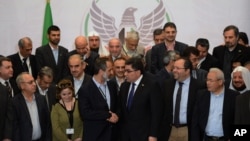Syria's opposition movement was in disarray Sunday, as the head of the main exiled opposition group resigned, and rebels inside the country rejected the group's appointment of an interim prime minister.
Syrian National Coalition leader Mouaz al-Khatib announced his resignation on his Facebook page. He complained that the international community has not done enough to help the Syrian people defend themselves from the forces of President Bashar al-Assad, who has been fighting a two-year rebellion against his autocratic rule.
In his statement, Khatib said he is keeping his promise to resign if members of his coalition crossed certain "red lines." He did not say what those are. Khatib had objected to last week's coalition appointment of American-educated businessman Ghassan Hitto as an interim prime minister for rebel-held parts of Syria.
Hitto's appointment at an opposition meeting in Istanbul weakened Khatib's authority as coalition chief.
Rebels defiant
The opposition's turmoil deepened, with a rebel spokesman inside Syria saying the mainstream Free Syrian Army refuses to recognize Hitto as prime minister. Louay Almokdad told Western news agencies that Hitto was not properly elected because there was no consensus on his candidacy.
Other rebels have said they do not need a prime minister because they already are governing areas under their control.
U.S. Secretary of State John Kerry said he was sorry to hear of Khatib's resignation. But, speaking in Baghdad Sunday, the top U.S. diplomat said the Syrian opposition is "bigger than one person" and leadership changes within it are "almost inevitable." Kerry said Washington has worked closely with Hitto in the delivery of aid to Syria and has confidence in his abilities.
Hitto received a majority 35 votes out of 48 cast at last Tuesday's coalition meeting. But several prominent dissidents boycotted the vote, accusing Hitto of being a pawn of Syria's Muslim Brotherhood and outside powers such as Qatar, which welcomed his election.
Moderate record
Khatib, a moderate Islamist, had led the coalition since November, when the exiled movement restructured itself to try to present a more united front to its Western and Arab backers.
He fled Syria last year after winning the respect of many Syrians for serving as the preacher of Damascus' Umayyad Mosque and opposing Assad's rule, despite being jailed several times.
Earlier this year, Khatib offered a dialogue with Syrian officials in return for the mass release of opposition detainees, angering coalition members who insist on Mr. Assad's ouster before any talks. Damascus ignored the proposal.
In his Facebook message, Khatib said his resignation will enable him to support the Syrian revolution with a "freedom that is not available inside the official institutions."
Arab League awaits
Arab diplomats said Sunday the Arab League had invited Khatib and Hitto to represent Syria at a two-day summit in the Qatari capital, Doha, beginning Tuesday. It is not clear which Syrian opposition figures will attend. The Arab League suspended the Assad government's membership in the bloc in 2011, and most members have called for his ouster.
Carnegie Middle East Center director Paul Salem said the Syrian opposition has been plagued by infighting since the start of the anti-Assad revolt in 2011. "The opposition has been very disunited, not presenting a convincing front either to those fighting inside Syria or to the regional or international community which would want to help them."
In one positive development for the opposition, some members of President Assad's minority Alawite sect gathered in Cairo on Sunday to express support for the rebellion and distance themselves from his government. Syrian activists have long accused Assad of scaring Alawites into believing they face slaughter by majority Sunni rebels if his government falls.
Rebel gains in south
In the latest fighting in Syria, the Britain-based Syrian Observatory for Human Rights said rebels have seized a 25-kilometer strip of land near Syria's southern border with Jordan and the Israeli-occupied Golan Heights. The group said the rebels captured several military checkpoints in the strategic region in recent days, further weakening Mr. Assad's control.
Israel said its forces in the Golan returned fire at a Syrian position on Sunday. It was not clear if Syrian troops or rebels triggered the Israeli response. Israeli troops have come under fire from Syrian territory several times in recent weeks, prompting Israel to warn that it will hold the Syrian government accountable for any breaches of a decades-old cease-fire between the two longtime enemies.
Elizabeth Arrott in Cairo contributed to this report.




